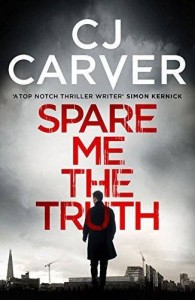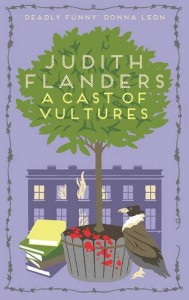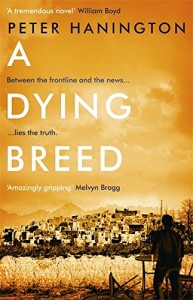 Spare Me the Truth by C. J. Carver
Spare Me the Truth by C. J. Carver
Published by Zaffre Publishing
A Cast of Vultures by Judith Flanders
Published by Allison & Busby
Tastes Like Fear by Sarah Hilary
Published by Headline
The Ashes of London by Andrew Taylor
Published by HarperCollins
A Dying Breed by Peter Hanington
Published by Two Roads
Brave women under serious threat are a feature of all but one of this month’s novels, but they are much more interesting than the over-familiar fem-jep subgenre in which a  sexually disturbed psychopath kidnaps, rapes, mutilates and murders vulnerable women.
sexually disturbed psychopath kidnaps, rapes, mutilates and murders vulnerable women.
C. J. Carver is one of the rare women writers who can deliver unremitting pace in her fiction. Spare Me The Truth begins with an intriguing scene: Dan Forrester, driving instructor, good father, and survivor of the serious breakdown that followed witnessing his baby son’s death, is stalked by a good-looking middle-aged woman who seems to know a great deal more about him than she should and threatens his young daughter. At the same time, PC Lucy Davies has been banished to the provinces from the Met after a screw-up. And the stalker’s GP daughter becomes the subject of horrible blackmail. The three stories clash, dovetail and clash again, involving the reader in high adventure and emotional excitement.
 Judith Flanders deals in less dramatic affairs in the bookish world of editor Sam Clair and her CID lover, Jake, but there are danger and high tension here too, and some thoroughly nasty villains. Sam lives to read, both for work and pleasure, but she also has discriminating taste in all life’s other pleasures as well. This first-person narrative is so witty and elegant that reading it is like being in the company of a highly civilized friend. Arson, lying, and the persecution of various well-meaning but inconvenient individuals are all convincing but, for me, less important than Sam’s take on life. Even when she’s more or less hanging by her fingernails from a tree in Kew Gardens while escaping gun-toting thugs, her comments on what is happening are thoroughly entertaining.
Judith Flanders deals in less dramatic affairs in the bookish world of editor Sam Clair and her CID lover, Jake, but there are danger and high tension here too, and some thoroughly nasty villains. Sam lives to read, both for work and pleasure, but she also has discriminating taste in all life’s other pleasures as well. This first-person narrative is so witty and elegant that reading it is like being in the company of a highly civilized friend. Arson, lying, and the persecution of various well-meaning but inconvenient individuals are all convincing but, for me, less important than Sam’s take on life. Even when she’s more or less hanging by her fingernails from a tree in Kew Gardens while escaping gun-toting thugs, her comments on what is happening are thoroughly entertaining.
Sarah Hilary’s Tastes Like Fear edges closer to traditional fem-jep but avoids the traps in a story about disappearing teenage girls and their desperate parents. The appealing DI Marnie Rome, who was introduced in Someone Else’s Skin, becomes involved when a fleeing girl causes a fatal car crash. But even Marnie’s investigative skills and courage fade in comparison with those of the surviving sister of one of the victims. Hilary’s depiction of 13-year-old Laura Beswick, Loz, is heartbreaking and convincing. This pacy, easy-reading novel is lifted by its perceptive examination of the distress of girls who don’t believe they fit their allotted space in the world and the agony of the parents who try to make them understand how deeply they are loved.
Hilary’s depiction of 13-year-old Laura Beswick, Loz, is heartbreaking and convincing. This pacy, easy-reading novel is lifted by its perceptive examination of the distress of girls who don’t believe they fit their allotted space in the world and the agony of the parents who try to make them understand how deeply they are loved.
Andrew Taylor’s persecuted woman is Catherine (Cat) Lovett, unhappy inhabitant of her uncle’s house in London at the time of the Great Fire in 1666. Her father is on Charles II’s hitlist as one of the worst of the regicides who presided over his father’s execution. All she wants to do is avoid a forced marriage to her revolting, greedy cousin and be allowed to produce architectural drawings of the great buildings and replanned city that must arise after the Fire. She first encounters Taylor’s hero, James Marwood, whose father is also persona non grata at the Restoration court, during the Fire itself. At this stage he believes she’s a fragile boy and when the flames set fire to her clothes, he beats them out with his own cloak and loses it when his protégé runs.
When bodies of men are found around the ashes of London with their thumbs tied together behind their backs, Marwood is commissioned to investigate. Delving into the reasons why they might have earned the hatred of the killer, he discovers a lot more about his own family and comes into contact with Cat once again. She has an urge to self-determination that will endear her to twenty-first-century readers and an almost kick-ass predilection for violence, which provides a nice balance to Marwood’s fundamental gentleness.
Very little gentleness is on offer in Peter Hanington’s first novel, A Dying Breed. This deals with William Carver, a foreign correspondent of a type familiar from the fiction of writers such as Graham Greene and John le Carré. Carver drinks vastly, rarely washes, has seen far too much horror and has no patience with careerism or bureaucracy. Given that he works for the BBC he encounters plenty of both but is well able to circumvent them. Hanington himself worked for Radio 4’s Today for many years and obviously knows  the world about which he’s writing. The action in the novel moves from Broadcasting House to Afghanistan, when a tailor’s shop is bombed while a powerful customer is being fitted for new clothes.
the world about which he’s writing. The action in the novel moves from Broadcasting House to Afghanistan, when a tailor’s shop is bombed while a powerful customer is being fitted for new clothes.
Carver is too good a hack to accept the official accounts of what has happened and why, but his recalcitrance and atrocious treatment of his producer, Vivian, force his bosses at home to send out a replacement, Patrick Reid, with orders to control him. Patrick, who is on his first assignment abroad, is a charming if apparently weedy fellow, who has no chance of making Carver do anything he doesn’t want. Soon Patrick is kidnapped by unknown locals. Hanington’s description of his terrified journey across Afghanistan and delivery into the hands of the notoriously brutal General Doushki is magnificent. Altogether this is a beautifully written account of myriad deceptions and mortal dangers in a country that has been at war with itself and the outside world for generations. And in the end there is gentleness here too. This is a terrific novel.

Judicious comments, as ever from Ms. Cooper